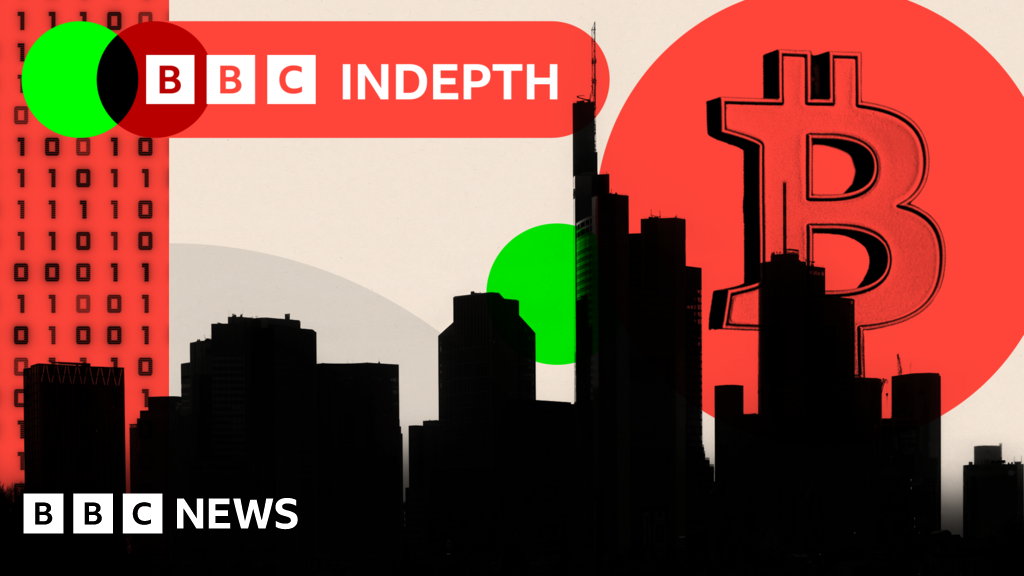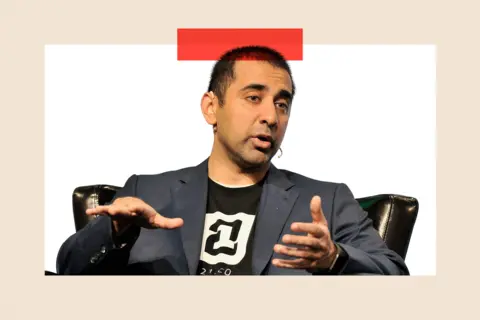The Bitcoin bros who want to crowdfund a new country

 BBC
BBCDo you look at the possibility of political turbulence ahead of November’s US presidential election and think: democracy could be in trouble? So does a group of tech entrepreneurs backed by big Silicon Valley money. And they love it.
Imagine if you could choose your citizenship the same way you choose your gym membership. That’s a vision of the not-too-distant future put forward by Balaji Srinivasan. Balaji – who, like Madonna, is mostly just known by his first name – is a rockstar in the world of crypto. A serial tech entrepreneur and venture capitalist who believes that pretty much everything governments currently do, tech can do better.
I watched Balaji outline his idea last autumn, at a vast conference hall on the outskirts of Amsterdam. “We start new companies like Google; we start new communities like Facebook; we start new currencies like Bitcoin and Ethereum; can we start new countries?” he asked, as he ambled on stage, dressed in a slightly baggy grey suit and loose tie. He looked less like a rockstar, more like a middle manager in a corporate accounts department. But don’t be fooled. Balaji is a former partner at the giant Silicon Valley venture capital firm Andreessen Horowitz. He has backers with deep pockets.
 Getty Images/Steve Jennings
Getty Images/Steve JenningsSilicon Valley loves “disruption”. Tech startups have been disrupting traditional media for years; now they are making inroads into other areas too: education, finance, space travel. “Imagine a thousand different startups, each of them replacing a different legacy institution,” Balaji told the audience. “They exist alongside the establishment in parallel, they’re pulling away users, they’re gaining strength, until they become the new thing.”
If startups could replace all these different institutions, Balaji reasoned, they could replace countries too. He calls his idea the “network state”: startup nations. Here’s how it would work: communities form – on the internet initially – around a set of shared interests or values. Then they acquire land, becoming physical “countries” with their own laws. These would exist alongside existing nation states, and eventually, replace them altogether.
You would choose your nationality like you choose your broadband provider. You would become a citizen of the franchised cyber statelet of your choice.
There is nothing new about corporations having undue influence in the affairs of nation states. The term “banana republic” derives from the fact that a US company, United Fruit, effectively ruled Guatemala for decades beginning in the 1930s. Apart from owning the majority of the land, they ran the railways, the postal service, the telegraph. When the Guatemalan government tried to push back, the CIA helped United Fruit out by instigating a coup.
But the network state movement appears to have greater ambitions still. It doesn’t just want pliant existing governments so that companies can run their own affairs. It wants to replace governments with companies.

As the US heads into a presidential election, Gabriel Gatehouse dives back into the labyrinthine rabbit warren of American conspiracy culture. Whilst liberals across the world worry about a possible return of Donald Trump, millions of Americans are convinced that their democracy has already been hijacked – by a sinister Deep State cabal. How did this happen? And who is behind it? That’s the story that Gabriel Gatehouse is investigating in this series of The Coming Storm.

There are those who view the network state idea as a neo-colonial project that would replace elected leaders with corporate dictators acting in the interests of their shareholders. But others think it’s a way of cutting through what they see as the regulation-infested state of Western democracies today. Sounds like a tech bro fantasy? Elements of the network state already exist.
The conference in Amsterdam included tech entrepreneurs showcasing some of these “startup societies”. There was Cabin, a “network city of modern villages” that has branches in the US, Portugal and elsewhere; and Culdesac, an Arizona-based community designed for remote working.
Balaji’s concept of the network state builds on the idea of “charter cities”, urban areas that constitute a special economic zone, similar to free ports. There are several such projects under construction around the world, including in Nigeria and Zambia. At a recent rally in Las Vegas, Donald Trump promised that, if elected in November, he would free up federal land in Nevada to “create special new zones with ultra-low taxes and ultra-low regulation”, to attract new industries, build affordable housing and create jobs. The plan would, he said, revive “the frontier spirit and the American dream”.
Culdesac and Cabin look more like online communities that have established territorial bases. Próspera is different. Located on an island off the coast of Honduras, it describes itself as a “private city” catering to entrepreneurs. It promotes longevity science – offering unregulated experimental gene therapies to slow the ageing process.
Run by a for-profit company based in Delaware in the United States, Próspera was granted special status under a previous Honduran government to make its own laws. The current president, Xiomara Castro, wants it gone, and has begun stripping it of some of the special privileges it was granted. Próspera is suing the government of Honduras for $10.8 billion.
Pitching a free-market cryptocity
At some point during the day-long pitching session in Amsterdam, a young man in a grey hoodie slouched on stage. His name was Dryden Brown. He said he wanted to build a new city-state, somewhere on the Mediterranean coast. It would be governed not by a giant state bureaucracy, but on the blockchain, the technology underlying cryptocurrency. Its founding principles would be ideas of “vitality” and “heroic virtue”. He called it Praxis, the Ancient Greek word for “action”. The first citizens of this new nation, he said, would be able to move in in 2026.
He was a little hazy on the details. Move in where exactly? Who would build the infrastructure? Who would run it? Dryden Brown fumbled with a remote and pulled up a slide, suggesting Praxis was backed by funds with access to hundreds of billions of dollars of capital.
For now, though, the “Praxis community” exists mainly on the internet. There is a website where you can apply for citizenship. Who, exactly, these citizens are, is unclear. Dryden flashed up another slide with his remote. It was a Pepe meme: the sad-looking cartoon frog that became an “alt-right” mascot during the Trump campaign in 2016.
In this niche world of startup nations, Praxis had a reputation for edginess. They hosted legendary parties: people spoke of candle-lit soirees in giant Manhattan loft spaces, where awkward computer coders mixed with hipster models and figures from the “Dark Enlightenment” – people like the blogger Curtis Yarvin, who advocates a totalitarian future in which the world is ruled by corporate “monarchs”. His ideas are sometimes described as fascist, something he denies. Attendees would be made to sign an NDA. Journalists were generally not welcome.
After his presentation, I went to talk to Dryden Brown. He seemed suspicious and a little cold, but he gave me his phone number. I messaged him a few times, trying to engage him in conversation. To no avail.
But then, about six months later, I spotted an intriguing notice on X. “Praxis magazine launch. Tomorrow night. Photocopy your favourite pages.” There was no time given, no location. Just a link where you could apply to attend. I applied. No answer. So, next morning, I texted Dryden Brown again. And to my surprise, he replied right away: “Ella Funt at 10pm.”
Ella Funt turned out to be a bar and nightclub in Manhattan. Formerly known as Club 82, it had once been a legendary spot on the New York gay scene; in the 1950s, writers and artists would go there to drink cocktails served by women in tuxedos and watch drag acts in the basement. Now it was hosting an exclusive party for people who wanted to start a new country. And I had somehow got myself an invite. But I was 2000 miles away in Utah. If I was going to make it in time, I had to get on a flight right away.
I was actually one of the first to arrive. The place was almost empty, with a few Praxis people laying out copies of their magazine around the bar. I flicked through it: expensive, heavy paper; lots of advertisements for seemingly random things: perfume; 3D-printed guns; one for just… milk. Like Pepe the Frog, milk is an internet meme. In “alt-right” circles, posting an icon of a white milk bottle signals white supremacy.
The magazine urged readers to “photocopy pages and paste them around your town” – a kind of analogue memetics. A Xerox machine had been wheeled into the bar for that very purpose.
A group of young men walked in, some wearing cowboy boots. They didn’t look like outdoor types though. I got talking to one of them. He introduced himself as Zac, a “crypto cowboy” from Milton Keynes (he was wearing a leather Stetson.)
“I kind of represent the American Wild West,” he said. “I feel as though we are at the frontier.”
Plenty of people associate cryptocurrencies with scams: highly volatile internet money, the value of which could disappear overnight. But in the world of the “network state”, they love crypto. They see it as the future of money – money that governments cannot control.
 Getty Images
Getty ImagesThe next person I got talking to called himself Azi. I asked for his surname. “Mandias,” he replied with a smile. It was a reference to a sonnet by Percy Bysse Shelley: Ozymandias, King of Kings. Anonymity is an important part of the crypto ethos. I got the feeling no one at this party was giving me their real names.
Mr Mandias was from Bangladesh originally, but had grown up in Queens, New York. He was the founder of a tech startup. He believed that, just as the printing press had contributed to the collapse of the feudal order in Europe 500 years ago, today new tech – crypto, the blockchain, AI – would bring about the collapse of the democratic nation state.
“Obviously, democracy is great,” he said. “But the best ruler is a moral dictator. Some people call [that] the philosopher king.”
The rise of the corporate king?
Azi said he was excited to be “on the precipice of what I think is the next renaissance”. But before this renaissance, he predicted a “Luddite movement” against new technology that would destroy millions of jobs and monopolise the global economy. The Luddites would fail, Azi said. Yet he predicted that the transition period to what he called the “next stage” of human societal evolution – the “network state” stage – would be violent and “Darwinistic”.
Far from being perturbed by this prospect, Azi seemed excited at the thought that out of the smouldering ashes of democracy, new kings would emerge: corporate dictators ruling over their networked empires.
I wandered over to the bar and got myself a drink. There I got talking to two young women who did not look like they were part of the crypto crowd. Ezra was the manager of another nightclub nearby, her friend Dylan was a student. It looked like they’d been invited to add a bit of glamour to what was – essentially – a party of crypto-bros and computer geeks. But they had some thoughts about the whole network state idea.
“What happens if you don’t have enough employees in the hospital or at the school for the kids?” Dylan asked. “It is unrealistic to start an entire city without any government.” To Ezra, the whole idea seemed dystopian. “We wanted to see what a ‘real’ cult meeting was like,” she said, I think in jest.
Just then, Dryden Brown appeared, the co-founder of Praxis. When he went outside for a cigarette, I followed him. The Praxis Magazine was a way to showcase the new culture he was hoping to build, he told me. Praxis, he said, was about “the pursuit of the frontier” and of “heroic virtue”.
I doubted Dryden would last very long in a covered wagon out on the prairie. He looked exhausted by it all. I wanted to ask him some pointed questions about the network state project: who would be the citizens of this brave new world? Who would govern it? What was with all the alt-right memes? And – Dylan’s question – who was going to staff the hospitals?
But we kept getting interrupted by more guests arriving. Dryden Brown invited me to visit the “Praxis Embassy” the following day. We said our see-you-tomorrows and went inside. The party was getting wilder. Ezra and Dylan and some friends who looked like models were climbing up on top of the Xerox machine. They were busy photocopying – not pages from the magazine, but bits of their bodies. I grabbed a copy of the magazine and left.
Back at my tiny Airbnb above a Chinese supermarket, I leafed through it. Alongside the white supremacist memes and ads for guns, there was a QR code. It linked to a short film: a 20-minute polemic against the emptiness of modern life, a lament for a vanished world of hierarchies and heroism.
Between the lines
“You are entertained and satiated,” the narrator intones, “you are seemingly productive. But you are not great.” The voice talks about the “algorithms making you hate yourself and your own civilisation”.
At this point in the film, the screen shows an animated figure pointing a pistol straight at the viewer.
“Contemporary media proclaims that having any ideals is fascist,” the voice continues. “Everything of conviction is fascist.”
Was it an invitation to embrace the label of fascism? This movement seemed to yearn for a specific conception of Western culture – a Nietzschean world in which the fittest survive, where disruption and chaos give birth to greatness.
The next day, I stopped by the “Praxis Embassy” – a giant loft space on Broadway. The bookshelves were indeed filled with copies of Nietzsche, biographies of Napoleon and a volume entitled The Dictator’s Handbook. I hung around for a bit, but Dryden Brown never turned up.
I left wondering what exactly it was I had witnessed the previous night: was it a glimpse of the future, in which countries like the United States and the UK would collapse into a spider’s web of corporate societies, a world in which you could choose to become a citizen of a cyber statelet? Or were Dryden Brown and his friends just “trolling”, a bunch of tech bros roleplaying as alt-right revolutionaries in order to have a laugh at the expense of the establishment, and enjoy a good party?
Might Dryden Brown one day become a CEO-king, ruler of an alt-right franchised empire with outposts dotted around the Mediterranean? I doubt it. But there are moves to promote more autonomous zones, free ports and charter cities. And if democracy is in trouble, the network state movement looks like it is waiting in the wings.
Top image credit: Getty
BBC InDepth is the new home on the website and app for the best analysis and expertise from our top journalists. Under a distinctive new brand, we’ll bring you fresh perspectives that challenge assumptions, and deep reporting on the biggest issues to help you make sense of a complex world. And we’ll be showcasing thought-provoking content from across BBC Sounds and iPlayer too. We’re starting small but thinking big, and we want to know what you think – you can send us your feedback by clicking on the button below.
Related
EU denies picking on US tech giants, says US also…
BRUSSELS (Reuters) - Europe's new tech rule aims to keep digital markets
H-1B Visa 2025: How and why US policy shift may…
Recent changes in US H-1B visa policies have sparked significant concern within the Indian IT professional community hoping to work in America. However, the a
Alibaba Group (BABA) Stock: Chinese Tech Giants Gain $439 Billion…
Chinese tech stocks have gained over 40% this year, adding $439 billion in valueChina’s “7 titans” are outperforming the US “Magnificent Seven” tech s
The Global Spread of Protectionist Policies That Squeeze American Tech…
An increasing number of countries in recent years have begun targeting America’s leading technology firms with policies touted as measures to promote fair com














